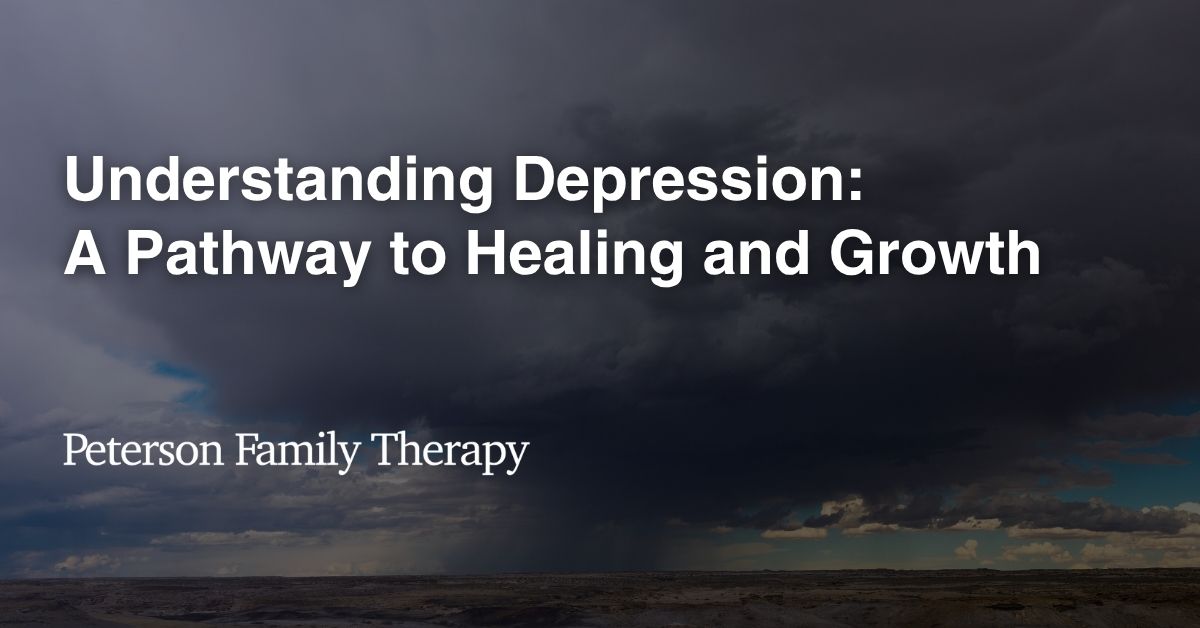Understanding Depression: A Pathway to Healing and Growth
At Peterson Family Therapy in Salt Lake City, we work with couples, families, and individuals facing a wide range of mental health challenges. One condition that affects many of our clients—and millions of people nationwide—is depression. I want to share my perspective on understanding depression, how it impacts relationships, and most importantly, how we can treat it effectively.

Depression in Utah: You’re Not Alone
Recent data from the CDC shows that approximately 1 in 4 Utah residents (22.5%) experienced symptoms of anxiety or depression as of late 2024. While Utah’s depression rates have significantly improved from pandemic peaks—dropping from over 32% in late 2020 to 14.7% today—depression remains a common experience that affects individuals and families throughout our state.
What Depression Really Looks Like
Depression is often misunderstood. While many people think of it as simply feeling sad, the reality is more complex. Depression is frequently characterized by a lack of feeling altogether—a profound numbness that can be more distressing than sadness itself.
People experiencing depression commonly report:
- Emotional numbness or feeling disconnected from their emotions
- Persistent negative thinking with an inner voice saying they’re not good enough or worthy
- Overwhelming shame about themselves or their circumstances
- Hopelessness about the future or their ability to change their situation
It’s crucial to understand that depression doesn’t always look the way we expect. Sometimes people who are depressed may appear angry or anxious rather than sad. This is why professional assessment is so important—what looks like anger or anxiety on the surface may actually be depression underneath.
The Science Behind Depression
Depression has a significant genetic component. Many people carry genes that make them more susceptible to developing depression, which is why a combination of talk therapy and medication is usually the most effective treatment approach.
This isn’t about weakness or personal failure—it’s about brain chemistry and genetic predisposition, and knowing this can help remove some of the self-blame that comes with depression.
How Depression Affects Relationships
In my work with couples using Emotionally Focused Therapy (EFT), I’ve observed how depression becomes part of what we call the “negative cycle” in relationships. When one or both partners are experiencing depression, it affects:
- How they think about themselves and their relationships
- What they do (or don’t do) in daily interactions
- How they communicate their needs and emotions
This creates a cycle where depression triggers certain behaviors, which then trigger reactions from the partner, leading to more negativity and reactivity. The depression becomes intertwined with the relationship dynamics, making both the depression and the relationship problems worse.
This is why it’s essential that we assess for depression in couples therapy. Sometimes what appears to be a relationship problem is actually rooted in untreated depression affecting one or both partners.
Depression as a Gateway to Growth
While depression is undoubtedly painful, I’ve come to see it as potentially a gateway to great healing and emotional growth. When we work through depression therapeutically, it often leads to:
- Deeper self-understanding and awareness of patterns
- Emotional growth and resilience
- Stronger relationships built on authentic connection
- More passionate and fulfilling lives on the other side of healing
The key is having the right support system in place during this difficult journey.
Our Approach to Depression Treatment
At Peterson Family Therapy, we take depression seriously and treat it as both a chemical and emotional condition. Our approach includes:
Comprehensive Assessment: We carefully evaluate each client to understand their unique experience of depression and how it’s affecting their life and relationships.
Integrated Treatment: We believe in combining talk therapy with medication when appropriate, working closely with psychiatric providers to ensure comprehensive care.
Relationship Focus: When working with couples, we address how depression is affecting the relationship dynamic and help both partners understand and respond to depression more effectively.
Experienced Support: Having worked with depression for many years, we’re comfortable walking alongside clients through their darkest times, providing the steady support needed for healing.
You Don’t Have to Walk Through This Alone
If you’re struggling with depression—whether as an individual or as part of a couple—please know that help is available. Depression is treatable, and we’ve witnessed countless clients emerge from their depression to live healthier, more passionate lives.
The journey through depression can be challenging, but with the right therapeutic support, it can also be transformative. At Peterson Family Therapy, we’re here to walk through that journey with you.
If you’re experiencing depression or believe it may be affecting your relationship, we invite you to reach out for a consultation. Contact Peterson Family Therapy today to learn more about how we can support your healing journey.



Leave a Reply
Want to join the discussion?Feel free to contribute!